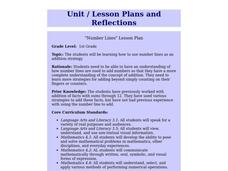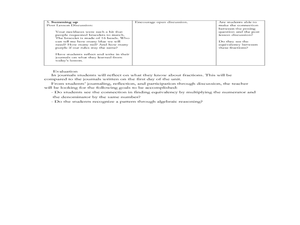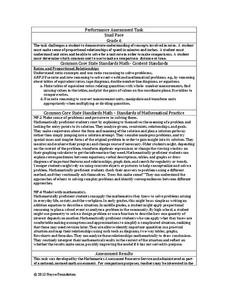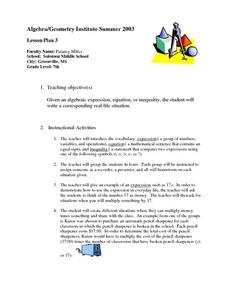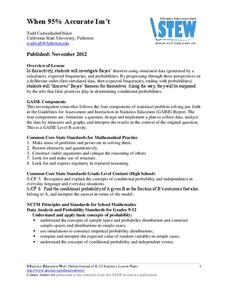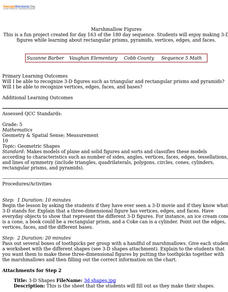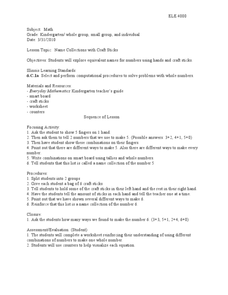Curated OER
My Test Book: Reading Pie Charts
In this math skills worksheet, students solve 9 multiple choice math problems that require them to read and interpret charts. Students may view the correct answers.
Curated OER
Number Lines
First graders examine the number line as an addition strategy. In this math lesson, 1st graders create a number line and use it to help them solve addition problems.
Curated OER
Giggle, Giggle, Quack Pizza Fractions
Students explore the concept of multiplication by using pizza. They read an article discussing how math is used everyday. They try to determine how many pizzas they would need to feed the class.
Curated OER
Representing and Extending Patterns
Young scholars explore repeating and growing patterns. In this patterns lesson, students describe patterns, explore changing patterns and match patterns. Young scholars participate in online activities and read books that show...
Curated OER
Exploring Pascal's Triangle and Other Recursive Patterns
Students explore patterns in everyday life and in the mathematic world. They create various concrete examples of patterns and verbally describe these patterns to a fellow student.
Curated OER
Explorations with Shapes
Students describe, identify and compare two-dimensional figures. They also name and demonstrate the relative position of objects using directional words. They sort and compare two-dimensional figures and three-dimensional objects...
Curated OER
Points of Intersection
Learners solve systems of equations. In this solving systems of equations lesson, students look for the intersection of the two lines in the system. Learners solve systems that have one solution, no solution, and infinite...
Curated OER
Crafty Fractions
Fourth graders study fractions. In this fractions lesson, 4th graders define fraction-related vocabulary words. Students use beads to study fractions. Students draw shapes to study fraction equivalency and brainstorm fractions they use...
Curated OER
Problems and Their Solutions in Stories and Everyday Life
Students identify story elements. In this stories lesson, students read a story and identify the chracter, character traits, plot, setting and theme. Groups of students match problem and solution cards.
Noyce Foundation
Snail Pace
Slow and steady wins the race? In the assessment task, scholars calculate the rates at which different snails travel in order to find the fastest snail. Hopefully, your class will move much more quickly in finishing the task!
Curated OER
Real Life Situations
Pupils investigate different equations and think critically how they could represent a real-life situation. They should write a word problem to coincide with the given equations. The lesson plan requires students to use critical thinking...
Curated OER
Introducing the Concept: Rates
Sixth graders explore rates as a specific type of ratio, using visual examples of unit rates and unit prices to increase comprehension. They also practice solving problems that are modeled by the instructor. The well-scripted...
Curated OER
Discovering Math Concepts in Advanced Algebra
Young scholars explore the concept of Chinese contributions in mathematics. In this Chinese contributions in mathematics lesson, students research Chinese achievements in mathematics. Young scholars solve 3x3 systems of equations using...
Curated OER
Money Math
Young scholars investigate the characteristics of the different coins. The teacher presents each coin, and the students identify the distinguishing characteristics of each side of the coin, and the value of each coin. The young...
Statistics Education Web
When 95% Accurate Isn’t
Investigate the effect of false positives on probability calculation with an activity that asks scholars to collect simulated data generated by a calculator. To finish, participants analyze the probability of certain outcomes which lead...
California Education Partners
Linflower Seeds
How does your garden grow? Use proportions to help Tim answer that question. By using their understanding of proportional relationships, pupils determine the number of seeds that will sprout. They create their own linear...
California Education Partners
Speedy Texting
Model the effects of practice on texting speed. Pupils develop a linear equation that models the change in texting speed based on the amount of practice. The sixth performance task in an eight-part series requires learners to solve...
Curated OER
Marshmallow Figures
Students enjoy making 3-D figures while learning about rectangular prisms, pyramids, vertices, edges, and faces. After a lecture/demo, students use marshmallows, toothpicks and a worksheet imbedded in this lesson plan to create 3...
Tech4Learning
Fantastic Fractions
Learners study how shapes can be divided into equal parts, that each part be equal to its counterpart, and combining parts equals one whole. They make the shapes out of modeling clay and take digital pictures of its parts to create an...
Curated OER
Exploration of "Pillbugs"
Fifth graders define vocabulary terms, identify the characteristics of a pillbug, and create a dichotomous key. Then they examine the pillbugs and make observations and record these observations. Finally, 5th graders observe specific...
Curated OER
Measurement and Conversion of Units in a Recipe
In a cross-curricular measurement and literacy lesson, your class will identify and compare cooking measurement instruments. They read a recipe and sequence a set of similar instructions in which the steps have been mixed up....
Curated OER
Counting Coins
Second graders identify a quarter, dime, penny, nickel, and dime. They match the coin with it's monetary value, collect data on excel spreadsheet, and create a graph in Excel. Students participate in group activities.
Curated OER
Graphing It Daily
Students identify and demonstrate a positive learning attitude and use basic concepts and skills. Learners also communicate clearly in oral, artistic, written, and nonverbal form. Finally, students participate in the daily data...
Curated OER
Name Collections with Craft Sticks
Groups of Kindergarten students count craft sticks in different groups and name how many they have. They complete simple addition to ten with the use of manipulatives.

